What is the story about?
What's Happening?
Luis Vayas Valdivieso, the chair of the UN plastics treaty negotiations, has announced his resignation following pressure from the United Nations Environment Programme (UNEP) and criticism from member states and NGOs. The treaty talks, aimed at addressing global plastic pollution, have been stalled since August, with no agreement reached after three years of negotiations. Vayas Valdivieso faced criticism for releasing a draft text that was rejected by negotiators for lacking ambition and failing to address key issues such as plastic production limits and hazardous chemicals. His resignation leaves the treaty process in uncertainty, raising concerns about the governance and future of the negotiations.
Why It's Important?
The resignation of the chair of the UN plastics treaty negotiations is a significant setback for global efforts to combat plastic pollution. The stalled talks highlight the challenges of reaching consensus on environmental issues that involve diverse stakeholders with conflicting interests. The lack of progress in the negotiations may delay the implementation of measures needed to address the growing plastic pollution crisis, impacting ecosystems and human health worldwide. The situation underscores the need for effective leadership and transparent processes in international environmental governance to achieve meaningful outcomes.
What's Next?
The resignation of Luis Vayas Valdivieso may lead to a reevaluation of the negotiation process and the appointment of a new chair to guide the talks. UNEP and member states will need to address the governance issues and restore trust in the process to move forward. The negotiations may require a fresh approach to reconcile the differing priorities of stakeholders and develop a comprehensive treaty that effectively addresses plastic pollution. The outcome of these efforts will be crucial for setting global standards and commitments to reduce plastic waste and its environmental impact.
Beyond the Headlines
The turmoil in the UN plastics treaty negotiations reflects broader challenges in international environmental diplomacy, where competing interests and power dynamics can hinder progress. The situation raises ethical questions about the influence of industry lobbyists and the role of transparency in decision-making processes. The resignation may prompt discussions on improving the inclusivity and accountability of environmental negotiations, potentially leading to long-term changes in how global treaties are developed and implemented. The case also highlights the importance of civil society engagement in advocating for ambitious environmental policies.
















